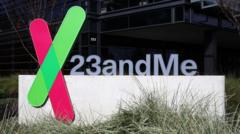23andMe, once a shining star in the tech industry, is currently on the brink of survival after experiencing a dramatic decline in its stock value. The company, known for its innovative DNA testing services, was previously valued higher than Apple but now grapples with the threat of delisting from stock exchanges. Despite its commitment to customer data privacy, analysts raise alarms over the firm's diminishing business model and the potential implications of its vast genetic database.
23andMe's Struggle: A Tech Giant on the Edge of Collapse

23andMe's Struggle: A Tech Giant on the Edge of Collapse
As DNA-testing company 23andMe faces financial turmoil, concerns about customer data privacy and the future of personalized genetics grow.
Three years ago, 23andMe enjoyed immense popularity, attracting millions with a promise of revealing ancestry and genetic insights. Celebrities like Snoop Dogg and Oprah Winfrey endorsed the service, and its share price soared to $321. Today, however, the share price has plummeted to nearly $5, causing concerns about its viability.
Experts point to two main issues affecting 23andMe’s downfall. First, the company lacks a robust business model, as customers only pay once for their DNA report without ongoing engagement. Second, efforts to monetize its anonymized DNA database for drug research have not yielded quick profits, due to the lengthy drug development timeline.
Leadership instability has also plagued the firm, with the board resigning and only co-founder and CEO Anne Wojcicki remaining from original leadership. Meanwhile, speculation about a potential merger or sale has intensified, though Wojcicki insists on taking the company private.
The stakes are particularly high when it comes to the sensitivity of genetic data. Experts warn that the implications of a data breach or change in ownership could affect not only individual customers but also their relatives who have not consented. Concerns have been raised about whether current data protections are sufficient.
While 23andMe asserts that legal frameworks and existing privacy terms will continue to protect customer data, critics advocate for stronger regulations against the trade of personal data to truly safeguard sensitive information. The fallout from 23andMe’s struggles illustrates the unique challenges faced by companies in the genetic testing sector amidst growing concerns about data privacy and company sustainability.
Experts point to two main issues affecting 23andMe’s downfall. First, the company lacks a robust business model, as customers only pay once for their DNA report without ongoing engagement. Second, efforts to monetize its anonymized DNA database for drug research have not yielded quick profits, due to the lengthy drug development timeline.
Leadership instability has also plagued the firm, with the board resigning and only co-founder and CEO Anne Wojcicki remaining from original leadership. Meanwhile, speculation about a potential merger or sale has intensified, though Wojcicki insists on taking the company private.
The stakes are particularly high when it comes to the sensitivity of genetic data. Experts warn that the implications of a data breach or change in ownership could affect not only individual customers but also their relatives who have not consented. Concerns have been raised about whether current data protections are sufficient.
While 23andMe asserts that legal frameworks and existing privacy terms will continue to protect customer data, critics advocate for stronger regulations against the trade of personal data to truly safeguard sensitive information. The fallout from 23andMe’s struggles illustrates the unique challenges faced by companies in the genetic testing sector amidst growing concerns about data privacy and company sustainability.























